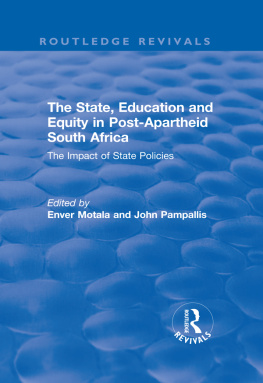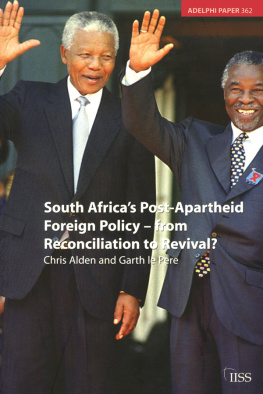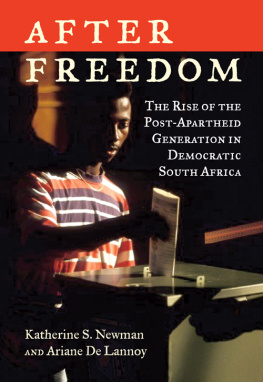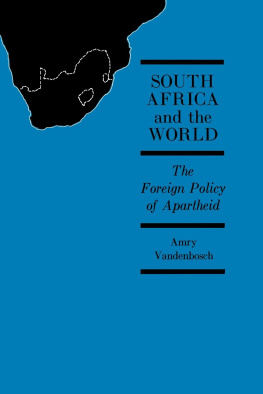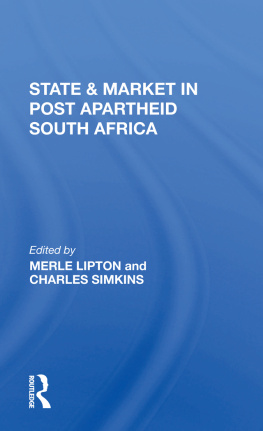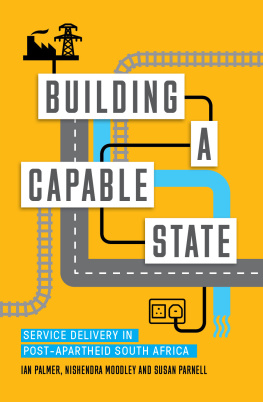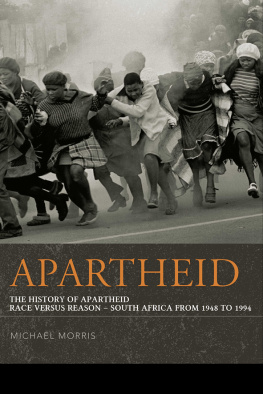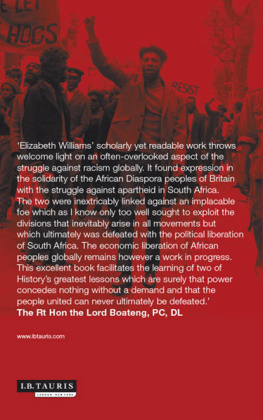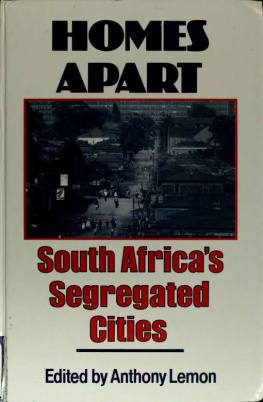The State, Education and Equity in Post-Apartheid South Africa
The Making of Modern Africa
Series Editors: Abebe Zegeye and John Higginson
Electoral Territoriality in Southern Africa
Stephen Rule
Community Health Needs in South Africa
Ntombenhle Protasia Khoti Torkington
Consolidation of Democracy in Africa
A view from the South
Edited by Hussein Solomon and Ian Liebenberg
Ghana in Search of Development
The challenge of governance, economic management and institution building
Dan-Bright S. Dzorgbo
Regional and Local Economic Development in South Africa
The experience of the Eastern Cape
Etienne Louis Nel
Agrarian Economy, State and Society in Contemporary Tanzania
Edited by Peter G. Forster and Sam Maghimbi
Entrepreneurial Ethics and Trust
Cultural foundations and networks in the Nigerian plastic industry
Yakubu Zakaria
Growth or Stagnation? South Africa heading for the year 2000
Mats Lundahl
Sudans Predicament
Civil war, displacement and ecological degradation
Edited by Girma Kebbede
First published 2002 by Ashgate Publishing
Reissued 2018 by Routledge
2 Park Square, Milton Park, Abingdon, Oxon OX14 4RN
711 Third Avenue, New York, NY 10017, USA
Routledge is an imprint of the Taylor & Francis Group, an informa business
Copyright Centre for Education Policy Development, Evaluation and Management (CEPD) 2002
The Editors have asserted their moral right under the Copyright, Design and Patents Act, 1988, to be identified as the authors of this work.
All rights reserved. No part of this book may be reprinted or reproduced or utilised in any form or by any electronic, mechanical, or other means, now known or hereafter invented, including photocopying and recording, or in any information storage or retrieval system, without permission in writing from the publishers.
Notice:
Product or corporate names may be trademarks or registered trademarks, and are used only for identification and explanation without intent to infringe.
Publishers Note
The publisher has gone to great lengths to ensure the quality of this reprint but points out that some imperfections in the original copies may be apparent.
Disclaimer
The publisher has made every effort to trace copyright holders and welcomes correspondence from those they have been unable to contact.
A Library of Congress record exists under LC control number: 2001095431
ISBN 13: 978-1-138-72364-1 (hbk)
ISBN 13: 978-1-315-19290-1 (ebk)
Contents
Enver Motala and Mala Singh
Enver Motala and John Pampallis
Sophie Oldfield
Katerina Nicolaou
Nisaar Mahomed
Jenni Karlsson, Gregory McPherson, John Pampallis
Salim Vally and Console Tleane
Enver Motala
Jenni Karlsson is the Director of the Education Policy Unit at the University of Natal.
Nisaar Mahomed is Deputy Director: Human Resource Management for the KwaZulu-Natal Department of Economic Development and Tourism. At the time of writing the contribution to this book, he was a researcher at the Human Sciences Research Council in Pretoria.
Gregory McPherson is a researcher at the Education Policy Unit of the University of Natal.
Enver Motala is an independent consultant in the area of education, as it relates to political and economic transformation.
Katerina Nicolaou is a researcher at the National Institute for Economic Policy.
Sophie Oldfield is a geographer, lecturing in the Department of Environmental and Geographical Science at the University of Cape Town. Her research focuses on State restructuring and its implications for community and urban development.
John Pampallis is the Director of the Centre for Education Policy Development, Evaluation and Management.
Mala Singh is seconded to the Council for Higher Education from the National Research Foundation, and is Executive Director of the Higher Education Quality Committee of the Council for Higher Education.
Console Tleane is an Associate Researcher at the Education Policy Unit of the University of the Witwatersrand.
Salim Vally, a former teacher and trade unionist, is a Senior Researcher at the Education Policy Unit of the University of the Witwatersrand.
The research in this book was initiated by the Centre for Science Development (CSD), which was the research funding arm of the Human Sciences Research Council (HSRC). In 1999 the CSD became the division for Social Sciences and Humanities in the National Research Foundation.
In 1997 the CSD put in place a new policy framework for the support of research and postgraduate training in the humanities and social sciences. Research capacity development in order to produce a more representative research community (in race and gender terms), the promotion and support of research on themes pertinent to the countrys reconstructive agenda, and the fostering of research co-operation across disciplinary and institutional boundaries were critical components of CSDs new policy framework.
In 1998, the CSD raised funds from the Rockefeller Foundation which it combined with an allocation from its own resources to initiate research on the impact of new social policies in South Africa. The Centre for Education Policy Development, Evaluation and Management (CEPD) was commissioned to assemble a team of researchers to investigate the impact of macroeconomic and macropolitical policy on schools policy. Their brief was to examine this in relation to the achievement of equity and social justice measured against commitments in the Constitution, various White papers and other policy documents. The project was intended to be a pilot study for a new CSD focus in the field of Social Policy Impact Studies.
The team that was established consisted of researchers who had participated in education and training policy development processes for the democratic movement from before 1994 as well as younger and less experienced researchers. During the writing process, two workshops were held at which researchers could present work in progress for discussion by the whole team. These workshops also provided opportunities for students and research interns to participate in the process of scrutinising and assessing the research. The authors of the articles in the book are scholars with backgrounds in the fields of education, sociology, economics, philosophy, geography and information studies, thus providing a rich diversity of academic traditions on which to draw. Their institutional locations are equally diverse, and include universities, parastatals, non-governmental organisations and individual consultancies.
It is hoped that this collection of papers will make a positive contribution to debates about the nature of policy processes, especially in terms of the connections and disjunctures between policy development, official policy commitments and policy implementation. It is also hoped that these studies will assist in stimulating more research and debate on the impact of chosen social policies in South Africa in order to enable scholars, policymakers and ordinary citizens to engage with the nature and outcomes of the development trajectory in this country.

